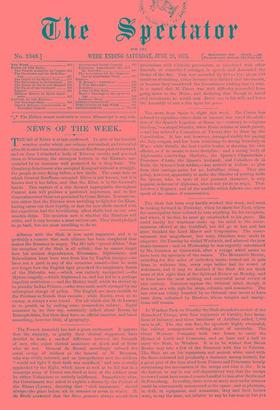The French Assembly has had a great excitement. It appears
that the majority, to gratify their clerical supporters, have decided to make a marked difference between the funerals of men who reject clerical assistance at death and of those who do not. General du Barrail accordingly refused the usual cortge of soldiers at the funeral of M. Brousses, who was civilly interred, and on interpellation said the soldiers 4' would not fight if their faith was sacrificed," and was stormily applauded by the Right, which knew as well as he did that in a conscript army of France one-third at least of the soldiers must be either Voltairians or entirely indifferent. Immediately after, the Government was asked to explain a decree by the Prefect of the Rhone (Lyons), directing that "civil interments" should always take place before six in summer or seven in winter. M. de Beuld answered that the libres penseurs always mixed their
processions with Catholic processions, or interfered with other funerals, or committed outrages in speech, and demanded the Order of the day. This was accorded by 413 to 251, about 100 members abstaining, either because they disliked civil interments, or because they considered the Government rushing fast to ruin. It is stated that M. Thiers was with difficulty persuaded from going down to the House, and declaring that though he hated civil interments, he would now direct one in his will, and leave the Assembly to cast a slur upon his grave.


































